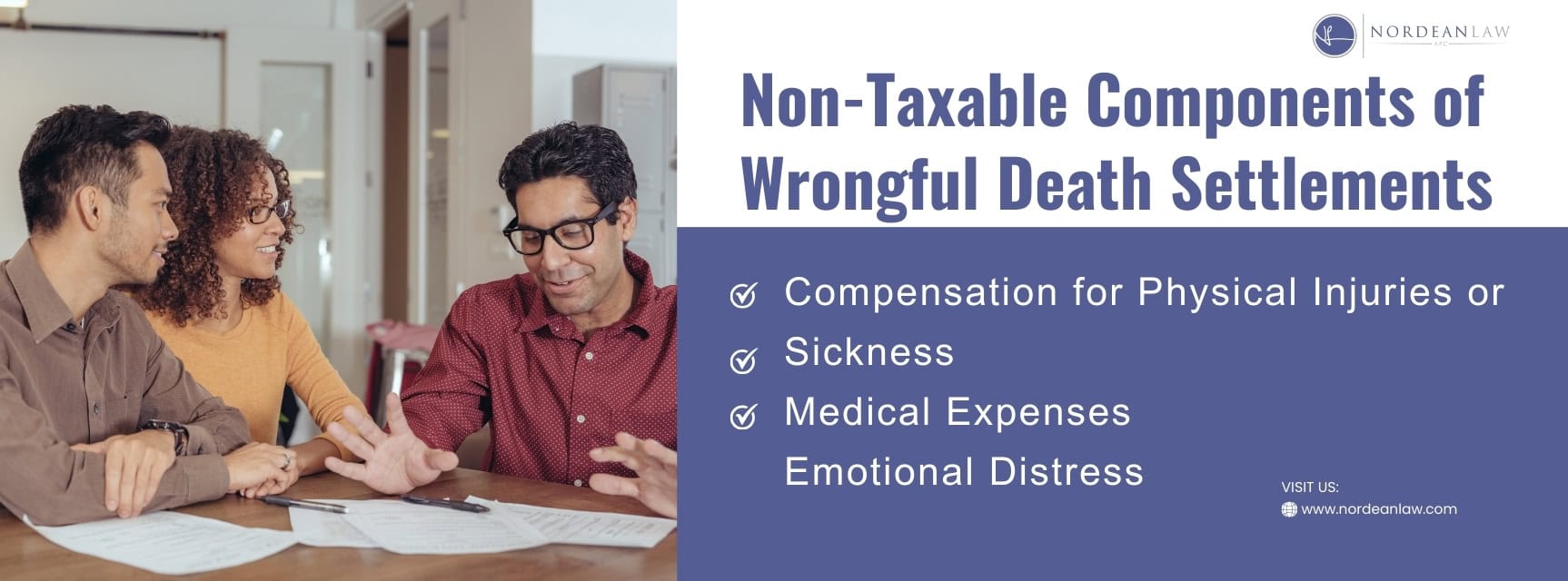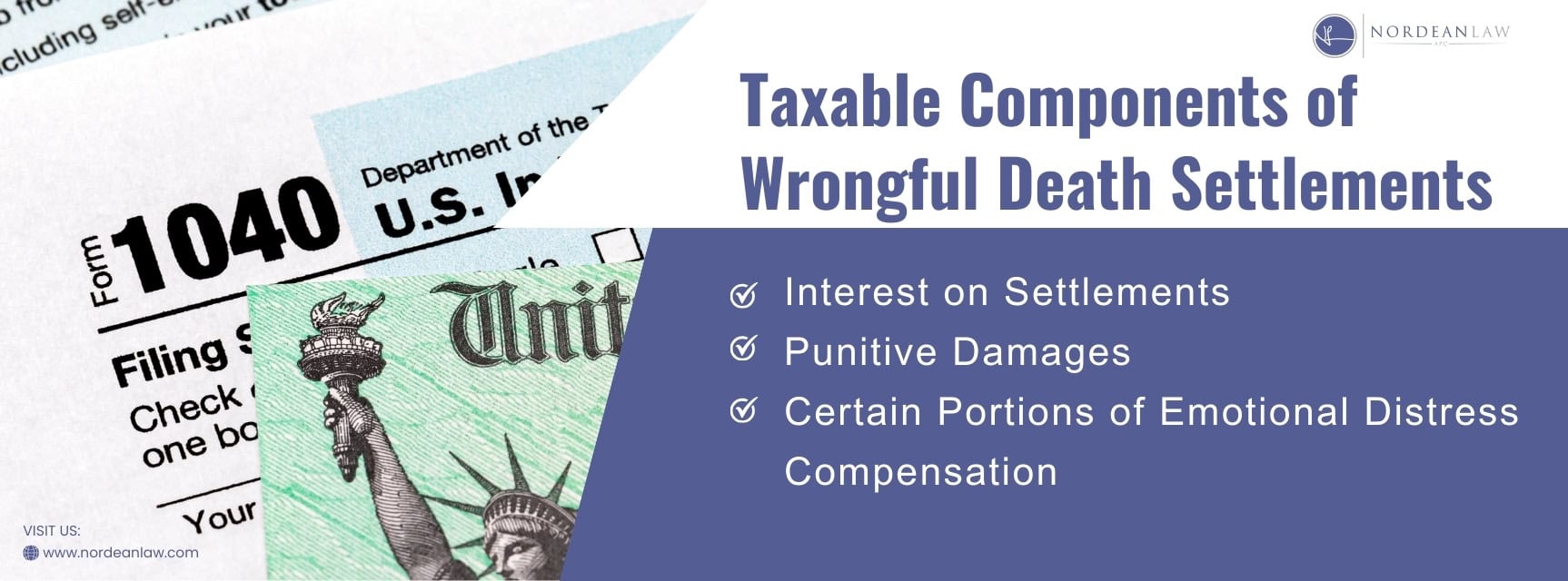Are wrongful death settlements taxable? Learn the tax rules and how they affect your financial recovery.

At Nordean Law, we strive to keep our community safe. We pursue justice for the injured and we share critical information on how to keep you and your family safe.
Follow the link below for the best tips to prevent accidents of all kinds. If you have a specific question, or if you were injured in an accident, reach out to one of our attorneys today.
Losing a loved one is hard enough without the added stress of figuring out taxes on wrongful death settlements. Many people wonder, “Are wrongful death settlements taxable?” It’s a significant concern for the surviving families seeking justice and support through these challenging times.
Wrongful death settlements help families financially after losing a loved one, but understanding tax rules can be confusing. Nordean Law understands the importance of clear guidance during such difficult periods and help you navigate the legal and financial aspects of your settlement with ease and confidence. Our wrongful death lawyers provide you the right advice and support, securing a fair settlement for your loss.
Wrongful death settlements provide financial support to families after losing a loved one due to someone else’s negligence or intentional harm. They cover the financial and emotional loss suffered. The surviving families are entitled to compensation for three types of damages: economic, non-economic and punitive damages. Nordean Law helps you understand your rights and evaluate the compensation you deserve.
Economic damages help cover the financial costs directly linked to the loss. These can include:
These damages are for the non-financial impact of the loss, such as:
Punitive damages are meant to punish the wrongdoer for particularly reckless or intentional actions and to deter similar actions in the future. These are not tied to specific financial or emotional losses but are based on the severity of the wrongdoer’s conduct.
When dealing with wrongful death settlements, you must understand the IRS (Internal Revenue Service) guidelines on taxation. The taxability of wrongful death settlements depends on the nature of the compensation provided. Generally, compensatory damages for personal physical injuries or physical sickness are not taxable. However, other components like punitive damages or interest may be taxable.

Non-taxable components of wrongful death settlements typically cover payments for physical injuries or sickness and related emotional distress. These aim to compensate the victim’s family for their loss, including pre-death medical expenses, pain, suffering, or the loss of life enjoyment.
Compensation for physical injuries or sickness: Amounts awarded for the physical injuries or sickness that led to the wrongful death are not taxable. They are viewed as direct compensation for the loss suffered, rather than income.
Medical expenses: Any compensation that covers medical expenses incurred due to the injury or sickness before death is not taxable, aligning with the principle of direct compensation for loss.
Emotional distress: Payments for emotional distress that is directly related to physical injuries or sickness are also exempt from taxation. It acknowledges the integral link between physical harm and emotional suffering.

Some aspects of wrongful death settlements may be subject to taxes, such as interest accrued on the settlement before distribution and punitive damages.
Interest on settlements: If the settlement accrues interest before it’s paid, that interest is taxable. This is because the interest is considered income generated from the settlement amount. For example, if the settlement amount is $500,000 and accrues an interest of $50,000 before it’s paid, this $50,000 would be taxable.
Punitive damages: Punitive damages in wrongful death settlements are taxable, as they are meant to punish the wrongdoer rather than compensate the victim’s family, making them considered as additional income. It’s important to distinguish between compensatory and punitive damages when assessing the tax implications of your settlement.
Certain portions of emotional distress compensation: While compensation for emotional distress related to physical injuries is non-taxable, compensation for emotional distress not directly linked to physical injuries may be taxable.
It’s important to consult with a tax professional or legal advisor to fully understand your specific settlement’s tax implications.
Special considerations and exceptions can affect the taxation of wrongful death settlements. These include
1. State laws
The tax treatment of wrongful death settlements can vary significantly from state to state. For instance, according to California wrongful death laws compensatory damages for pain and suffering are non-taxable, while punitive damages are taxable.
2. Estate taxes
In some cases, portions of a wrongful death settlement may be subject to estate taxes if they are included in the deceased’s estate. This is particularly relevant for larger settlements that may exceed the estate tax exemption threshold.
3. Allocation of settlement
Settlement allocated between taxable and non-taxable components can also affect its taxability. It’s essential to clearly separate compensatory damages, which are generally not taxed, from punitive damages, which are taxable, for tax reporting purposes.
4. Legal expenses
Legal expenses in obtaining a wrongful death settlement may be deductible, potentially reducing the taxable portion of the settlement. It can apply to both taxable and non-taxable components, depending on the circumstances.
Taking the right steps minimizes taxes and ensure that you’re making the most of a wrongful death settlement, while honoring the memory of the loved one you’ve lost.
The tax implications of wrongful death settlements is complex, requiring careful consideration and professional advice. Understanding the complications between taxable and non-taxable components is crucial to managing potential tax obligations effectively. Each settlement is unique, and consulting with a wrongful death settlement lawyer can provide clarity and peace of mind.
Nordean Law understands the legal and tax complexities of wrongful death settlements. Our personal injury lawyers support you throughout this difficult process. Contact us today if you’re facing the aftermath of a wrongful death and are unsure about the tax implications of your settlement.
Even without a 1099 form, you’re responsible for reporting taxable portions of a settlement to the IRS. Failure to report can result in penalties and interest on unpaid taxes.
Insurance companies may issue a 1099 form for taxable settlements exceeding certain thresholds. However, the obligation to report taxable income to the IRS ultimately lies with the recipient.
честные казино с быстрыми выплатамибездепозитные бонусы казиноиграть в лучшем казино на деньгибаза казино с бездепозитным бонусомонлайн казино Россииcasino oyunuReport taxable settlement income on your tax return in the appropriate sections, such as “Other Income” for punitive damages. Use a tax professional to ensure accurate reporting.
The taxable portion of a settlement varies based on its components. Compensation for physical injuries or sickness is not taxable, while punitive damages and compensation for lost wages are taxable.
To minimize taxes on a lawsuit settlement, it’s important to have the settlement clearly outline the portion of the award that compensates for physical injuries or sickness, as this is typically not taxable. Ensuring such compensation is distinctly noted in the settlement agreement can help avoid taxes on those specific amounts.
Lawsuit settlements that compensate for physical injuries or sickness are generally not taxable. Taxable settlements include compensation for emotional distress not related to physical injury, lost wages, and punitive damages.
You need to report settlement money to the IRS if it falls under taxable income categories, such as punitive damages or lost wages. However, you may not need to report compensation directly related to physical injuries or sickness.
Medical malpractice settlements are not taxable if they compensate for physical injuries or sickness. However, portions of the settlement for lost wages or punitive damages are taxable.
Punitive damages are taxable. Even if awarded as part of a wrongful death settlement, they are considers taxable income because they are not directly compensating for physical injuries or sickness.